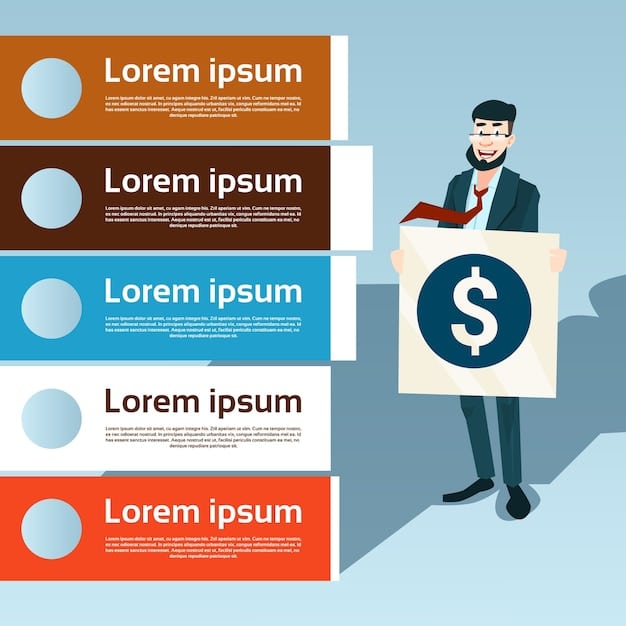Stay Compliant: SEC Regulations for Startup Fundraising in 2025

Stay Compliant: Understanding the New SEC Regulations for Startup Fundraising in 2025 is crucial for startups to navigate the fundraising landscape successfully. This article outlines key aspects of these regulations, ensuring businesses remain compliant and avoid potential legal pitfalls.
Navigating the complex world of startup fundraising requires more than just a brilliant idea and a solid business plan. It demands a thorough understanding of the regulatory landscape, especially as it pertains to securities laws. As we look ahead to 2025, being aware of and prepared for the new SEC regulations becomes paramount for any startup seeking funding.
This article aims to provide a comprehensive overview of these regulations, helping entrepreneurs stay compliant: Understanding the New SEC Regulations for Startup Fundraising in 2025 and maximize their chances of securing the capital they need to grow. Successfully navigating the complexities of stay compliant: Understanding the New SEC Regulations for Startup Fundraising in 2025 will position your startup for success and continued growth, fostering investor confidence and mitigating legal risk.
Understanding the Evolving SEC Landscape
The Securities and Exchange Commission (SEC) plays a critical role in overseeing securities offerings and protecting investors. As markets evolve and new technologies emerge, the SEC adapts its regulations to address emerging risks and ensure fair practices. Understanding this ever-changing landscape is vital for startups looking to raise capital legally and ethically.
Key Areas of SEC Oversight
The SEC’s oversight extends to various aspects of startup fundraising, including:
- Regulation D offerings, which provide exemptions from registration for certain private placements.
- The use of crowdfunding platforms for raising capital from a large number of investors.
- Disclosures required in offering materials, ensuring investors have access to accurate and complete information.
- The definition of accredited investors and the rules governing who can participate in certain investment opportunities.
Keeping abreast of these areas allows startups to proactively stay compliant: Understanding the New SEC Regulations for Startup Fundraising in 2025 and avoid costly penalties or legal challenges. Furthermore, a commitment to compliance enhances a startup’s reputation and attracts serious investors who value integrity.

Regulation D: A Crucial Exemption for Startups
Regulation D is one of the most commonly used exemptions for startups seeking to raise capital without registering their securities with the SEC. This regulation provides a framework for private placements that allows companies to raise significant amounts of money while avoiding the extensive and costly registration process.
Understanding Rule 506(b) and 506(c)
Within Regulation D, Rule 506(b) and Rule 506(c) are two key exemptions. Rule 506(b) allows companies to raise an unlimited amount of money from accredited investors and up to 35 non-accredited investors. Rule 506(c), on the other hand, permits general solicitation and advertising, but requires companies to take reasonable steps to verify that all investors are accredited.
How to Stay Compliant: Understanding the New SEC Regulations for Startup Fundraising in 2025 under Regulation D
- Filing Form D with the SEC within 15 days of the first sale of securities.
- Ensuring that all investors meet the accredited investor requirements, particularly under Rule 506(c).
- Providing adequate disclosures to investors, including information about the company’s business, financial condition, and management.
- Avoiding any misleading or false statements in offering materials or advertising.
By adhering to these guidelines, startups can confidently raise capital under Regulation D while remaining compliant with SEC regulations. Stay compliant: Understanding the New SEC Regulations for Startup Fundraising in 2025 and adhering to these guidelines avoids costly penalties or legal challenges.
Crowdfunding: Navigating the Rules for Raising Capital Online
Crowdfunding has emerged as a popular avenue for startups to raise capital from a large number of investors through online platforms. While crowdfunding offers numerous benefits, it’s essential to understand and comply with the SEC’s rules governing these offerings.
Key Requirements for Crowdfunding Offerings
Under Regulation Crowdfunding, companies can raise up to $5 million in a 12-month period. However, there are specific requirements that must be met, including:
- Filing an offering statement with the SEC and providing ongoing reports.
- Conducting the offering through a registered crowdfunding platform.
- Limiting the amount that individual investors can invest, based on their income and net worth.
- Providing clear and accurate information about the company and the offering.
Compliance with these requirements is crucial for startups utilizing crowdfunding to raise capital. Stay compliant: Understanding the New SEC Regulations for Startup Fundraising in 2025 and paying close attention to advertising rules ensures that the company avoids any possible penalties.

Disclosures: Providing Investors with Accurate Information
Disclosure is a cornerstone of securities law. The SEC mandates that companies provide investors with accurate and complete information about their business, financial condition, and the terms of the offering. This ensures that investors can make informed decisions about whether to invest in the company.
What Information Needs to Be Disclosed?
The specific information that needs to be disclosed depends on the type of offering. However, some common disclosures include:
- A detailed description of the company’s business, including its products, services, and market.
- Financial statements, including balance sheets, income statements, and cash flow statements.
- Information about the company’s management team and their experience.
- A description of the securities being offered, including the rights and preferences of shareholders.
Providing thorough and accurate disclosures is essential for **stay compliant: Understanding the New SEC Regulations for Startup Fundraising in 2025**. Moreover, transparent disclosures foster trust with investors and contribute to a positive reputation for the company. Investors will feel safe investing knowing that the company is well managed and well compliant with new and already existing regulations.
Enforcement: Penalties for Non-Compliance
The SEC takes enforcement seriously and has the authority to investigate and prosecute companies and individuals who violate securities laws. Penalties for non-compliance can be severe, including fines, injunctions, and even criminal charges.
Common Violations of SEC Regulations
Some common violations of SEC regulations in the context of startup fundraising include:
- Making false or misleading statements in offering materials or advertising.
- Selling securities to non-accredited investors in violation of Regulation D.
- Failing to file required reports with the SEC.
- Engaging in insider trading or other fraudulent activities.
**Stay compliant: Understanding the New SEC Regulations for Startup Fundraising in 2025** is paramount for startups to avoid the potentially devastating consequences of SEC enforcement actions. Proactive compliance efforts can significantly reduce the risk of running afoul of securities laws.
Looking Ahead: Anticipating Future Regulatory Changes
The regulatory landscape is constantly evolving, and startups need to stay informed about potential future changes that could impact their fundraising activities. The SEC is always looking for ways to better protect investors while still promoting capital formation. Staying informed about potential future changes that could impact your fundraising activities proves to be an invaluable advantage.
How to Stay Informed
Some ways to stay informed about future regulatory changes include:
- Monitoring the SEC’s website for updates and announcements.
- Subscribing to industry newsletters and publications.
- Attending conferences and webinars on securities law topics.
- Consulting with legal counsel who specializes in securities regulations.
By staying proactive and informed, startups can stay compliant: Understanding the New SEC Regulations for Startup Fundraising in 2025 and be prepared for any regulatory changes that may come their way. Being prepared for any regulatory changes that come allows small businesses to continue to remain on top.
| Key Point | Brief Description |
|---|---|
| 🔑 Regulation D | Exemption for private placements, avoiding SEC registration. |
| 💰 Crowdfunding | Raising capital online, complying with Regulation Crowdfunding. |
| 📝 Disclosures | Providing accurate financial and business information to investors. |
| 👮 Enforcement | SEC’s authority to investigate and penalize securities violations. |
Frequently Asked Questions
The SEC oversees various aspects, including Regulation D offerings, crowdfunding, disclosures, and accredited investor definitions. Staying compliant: Understanding the New SEC Regulations for Startup Fundraising in 2025 means understanding these areas.
Regulation D provides exemptions from SEC registration for certain private placements, allowing startups to raise capital without the full registration process, helping them avoid the heavy costs of registering with the SEC.
Crowdfunding allows startups to raise capital from a large number of online investors. It requires filing with the SEC, using a registered platform, and limiting individual investments. To stay compliant: Understanding the New SEC Regulations for Startup Fundraising in 2025, follow SEC guidelines.
Startups must disclose key information such as their business description, financial statements, management team details, and the terms of the securities being offered, helping potential investors get a clear picture of the company.
Penalties for non-compliance include fines, injunctions, and even criminal charges. To stay compliant: Understanding the New SEC Regulations for Startup Fundraising in 2025 will ensure you don’t have to worry about these potential penalties.
Conclusion
Navigating the SEC regulations for startup fundraising can be challenging, but by understanding the rules and staying informed, startups can successfully raise capital while remaining compliant. **Stay compliant: Understanding the New SEC Regulations for Startup Fundraising in 2025** is essential for long-term success and investor confidence.
By understanding the rules, seeking expert advice, and prioritizing transparency, startups can navigate the regulatory landscape with confidence and achieve their fundraising goals. Ultimately, compliance not only mitigates risk but also enhances a company’s reputation and attracts serious investors who value integrity and ethical practices.





